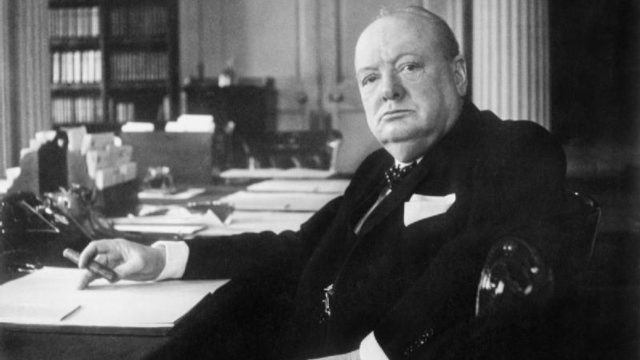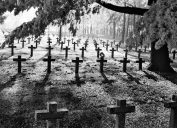Why This Prohibition-Era Doctor's Note for Winston Churchill Is Going Viral
"The quantity of [alcohol to consume] is indefinite."

Winston Churchill is known for many things: his witty comebacks, his rousing speeches, and leading Britain through World War II. But he's also known as a man who really liked to drink, so much so that there's some debate among historians about whether or not he was an alcoholic.
He started his mornings off with a "daily whiskey mouthwash" and continued drinking it throughout the day, his favorite being Johnny Walker Red Label. At lunch, he often enjoyed a bottle of champagne, preferably a Pol Roger served at a specific temperature. He capped his evenings off with a fine brandy. His capacity for booze was so bottomless that when he visited the White House, the staffers there would refer to it as "Winston Hours," as his drinking habits would put Roosevelt out of commission for a few days. As Churchill himself once said, "I've gotten more out of alcohol than alcohol has taken out of me."
Perhaps it's no surprise then, that Churchill actually got a doctor's note that would enable him to drink alcohol during Prohibition, so that he could continue boozing on his visits to America.
The 1932 note, shared by Twitter user Meredith Frost, is fairly hilariously phrased:
"This is to certify that the post-accident convalescence of the Hon. Winston Churchill necessitates the use of alcoholic spirits, especially at mealtimes. The quantity is naturally indefinite but the minimum requirements would be 250 cubic centimeters," it reads.
Winston Churchill gets a doctor's note to drink "unlimited" alcohol in prohibition America (1932) https://t.co/oku749CA16 pic.twitter.com/LCbgrjE9Zr
— Meredith Frost (@MeredithFrost) December 6, 2018
Better yet, there's a story behind it.
According to Martin Gilbert's biography, Winston Churchill: The Wilderness Years, Churchill was in New York in December 1931, and was running late to a dinner with financier Bernard Baruch on the Upper East Side. When he got out of his cab, he tried to hurry across the street, and ended up getting hit by a car going 35 miles an hour. His fatal flaw was that he had neglected to remember that traffic moves differently in the U.S. than it does in England.
"In England we frequently cross roads along which fast traffic is moving in both directions," Churchill later said in an article for the Daily Mail. "I did not think the task I set myself now either difficult or rash. But at this moment habit played me a deadly trick. I no sooner got out of the cab somewhere about the middle of the road and told the driver to wait than I instinctively turned my eyes to the left. About 200 yards away were the yellow headlights of an approaching car. I thought I had just time to cross the road before it arrived; and I started to do so in the prepossession—wholly unwarranted—that my only dangers were from the left."
He was rushed to Lenox Hill hospital, where he was treated for a fractured nose, fractured ribs, and a wound to the head. In the absence of alcohol, he asked the aesthetician for "chloroform or something." Though he was seriously ill, he didn't lose his sense of humor. "They almost got me that time, Thompson," he told his detective.
He took the whole of January off to recover in the Bahamas, where he recuperated "by sea and sunbathing, massage, and other aids."
In February, he returned to America to continue the lecture series that he had to cancel due to the accident, but this time, he came prepared with the doctor's note that would enable him to receive his preferred medicine whenever he liked. Apparently, before then, his strategy for circumventing Prohibition was to smuggle brandy in stone hot water bottles. What a legend.
For another viral note from one of history's great luminaries, check out Albert Einstein's advice to courier on how to lead a happy life.
To discover more amazing secrets about living your best life, click here to follow us on Instagram!





















